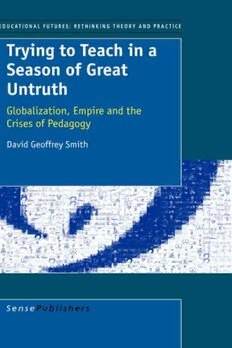
Trying to Teach in a Season of Great Untruth PDF
163 Pages·2006·1.124 MB·English
Most books are stored in the elastic cloud where traffic is expensive. For this reason, we have a limit on daily download.
Preview Trying to Teach in a Season of Great Untruth
Description:
These essays by Canadian scholar David Geoffrey Smith address contemporary issues in teaching, curriculum and pedagogy through tensions arising from the processes of globalization and empire. Of particular significance are the prejudices of Homo Oeconomicus or Economic Man (sic) that reduce the most profound of human relations, like those between the young and their elders, to an evermore constraining grammar of profit and loss. The predations of empire in turn divide the world into a site of war between friends and enemies, winners and losers. The times are dangerous, and educators need to speak to the world from the wisdom of their experience of standing with the young, for whom alone the future may still be open. David Geoffrey Smith is an outstanding author and educator. He is also one of the most honest and courageous people I have met. I eagerly devour everything he writes. His writings have the power to transform individuals as well as groups. This book will be a monumental contribution to worldwide education. CONRAD PRITSCHER, Professor Emeritus (Philosophy of Education), Bowling Green State University, Ohio, USA David Geoffrey Smith's latest book brings a new and urgently needed perspective to the fact that the world has never been, is not and will never be, the full invention of the West. This masterly crafted work immediately brings a fresh and liberating approach to the current debates on overcoming the multiple but mainly predatory incursions of empire; the book also achieves a clearly defined platform that calls, sans exception, for the historico-cultural and epistemological enfranchisement of hitherto marginalized spaces of learning, bodies of knowledge and lived contexts. As such, this is a bountiful harvest that should benefit all those who are rightly yearning for the still elusive but horizontally desirable polycentric world of ideas, issues and 'actualizable' praxes. ALI ABDI, Professor of International and Comparative Education, University of Alberta, Canada I have been reading David Smith's work since we first met in 1986, and it has changed my life, saved it I think. He has taught me that there is great relief to be had, great common strength or 'comfort' to be found, in facing our fears and realizing that the great neuroses we have inherited can be worked out. David walks these paths beautifully and meditatively. DAVID JARDINE, Professor of Education, University of Calgary, Canada
See more
The list of books you might like
Most books are stored in the elastic cloud where traffic is expensive. For this reason, we have a limit on daily download.
